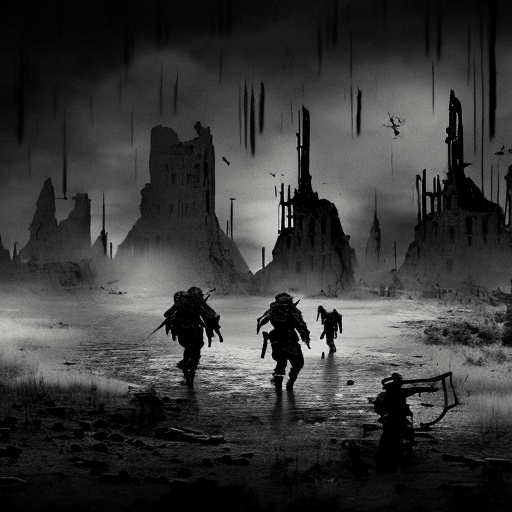One-line Summary:
All Quiet on the Western Front is a powerful anti-war novel that follows the experiences of a young German soldier during World War I, highlighting the physical and psychological toll of war.
The Horrors of War:
All Quiet on the Western Front vividly portrays the brutal realities of war, exposing the physical and psychological horrors that soldiers face on the front lines. The novel follows the journey of Paul Bäumer, a young German soldier who enlists in the army with his classmates, eager to serve their country. However, as they confront the harsh realities of trench warfare, they quickly realize that the glorified image of war they once held is far from the truth.
Throughout the book, author Erich Maria Remarque paints a grim picture of the battlefield, describing the constant threat of death, the gruesome injuries, and the overwhelming sense of fear and despair. The soldiers endure relentless artillery bombardments, engage in hand-to-hand combat, and witness the deaths of their comrades on a daily basis. The physical toll of war is evident as the soldiers suffer from hunger, exhaustion, and debilitating injuries. Remarque’s vivid descriptions allow readers to experience the horrors of war alongside the characters, creating a deeply emotional and harrowing narrative.
The Psychological Impact:
In addition to the physical dangers, All Quiet on the Western Front explores the profound psychological impact of war on the soldiers. Paul and his comrades struggle with the dehumanizing nature of war, as they witness the loss of their innocence and the erosion of their humanity. They are forced to confront the moral complexities of killing and the constant fear of their own mortality.
The soldiers also grapple with the psychological trauma of war long after they leave the battlefield. They struggle to reintegrate into civilian life, feeling disconnected from society and unable to relate to those who have not experienced the horrors they endured. The novel highlights the profound psychological scars that war leaves on individuals, emphasizing the lasting effects of trauma.
A Critique of Nationalism and Authority:
All Quiet on the Western Front serves as a powerful critique of nationalism and blind obedience to authority. Remarque challenges the notion of patriotism, questioning the motives behind war and the glorification of military service. Through the eyes of Paul and his comrades, the novel exposes the senselessness and futility of war, highlighting the devastating consequences it has on the lives of ordinary individuals.
The soldiers in the novel are not portrayed as heroes, but rather as victims of a system that exploits their youth and idealism for political gain. Remarque emphasizes the dehumanizing effects of war, showing how it strips away individuality and reduces soldiers to mere cogs in a machine. The novel encourages readers to question the authority figures who send young men to their deaths and to challenge the blind allegiance to nationalism.
- War is a brutal and dehumanizing experience that leaves lasting physical and psychological scars.
- The glorification of war and blind patriotism should be questioned and critiqued.
- The horrors of war extend beyond the battlefield and have a profound impact on soldiers’ lives long after the fighting ends.
“He fell in October 1918, on a day that was so quiet and still on the whole front, that the army report confined itself to the single sentence: All quiet on the Western Front.”
In conclusion, All Quiet on the Western Front is a poignant and thought-provoking novel that exposes the true cost of war. Through its vivid portrayal of the physical and psychological horrors of war, the book challenges the glorification of conflict and encourages readers to question the authority figures who perpetuate it. It serves as a powerful reminder of the devastating impact war has on individuals and the importance of preserving peace.












